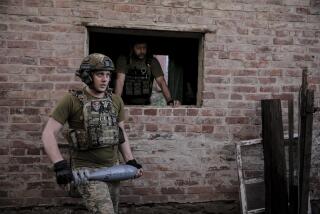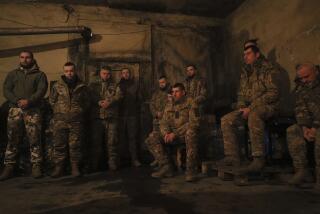Encourage, Reward Milosevic’s Foes
WASHINGTON — With Serbs and ethnic Albanians warily moving toward a peace agreement for the ravaged province of Kosovo, it is critical not to forget the continuing repression of the Serbs by Yugoslavian President Slobodan Milosevic. If his past behavior is any guide, Milosevic will not accede to a peace agreement brokered by the international community without making his own people pay for it. Each time he has promised to lighten up on Kosovo, promises he has invariably broken, he has cracked down on freedoms inside Serbia, crushing virtually all remnants of independent thought there.
Last May, when fighting between Serbs and Kosovo Albanians was in its third month, Milosevic promised U.S. envoy Richard C. Holbrooke that he would sit down with moderate Kosovar leaders. In return, the Yugoslav president was rewarded with the easing of just-imposed Western sanctions. That same day, his telecommunications ministry all but silenced Serbia’s only independent broadcasting network when it rejected license applications for 36 of 39 radio and television stations and clapped bankrupting fees on the remaining three. (The stations granted affordable licenses belong to Milosevic’s wife, son and daughter.) Five days later, Milosevic deposed the prime minister of Montenegro, Serbia’s sister republic, and installed in his place a longtime crony. Six days after that, the regime issued a decree forcing all University of Belgrade professors to sign loyalty oaths, thereby shredding the once-prestigious university’s prized autonomy. One hundred fifty professors refused to sign and, as a result, lost their jobs.
After five more months of bloodshed, Milosevic again backed down last October under the North Atlantic Treaty Organization’s threat to bomb his soldiers’ positions. He agreed to a cease-fire, troop withdrawal and the presence of unarmed international monitors in Kosovo. While the international community busied itself gearing up for humanitarian and monitoring missions, Milosevic rammed a public-information law through his pliant Serbian parliament, enabling him to ban all foreign news, shut down all publications critical of his regime and seize their assets.
Now members of the Serb democratic opposition fear that their dictator, caught in an endgame with the international community over the presence of a NATO force in Kosovo, will again punish his people for each concession he is forced to make. Moreover, they worry that the international community, as after the Dayton accords, will view Milosevic as a guarantor of any new agreement and, in the name of stopping the killing in Kosovo, will turn a blind eye to whatever nonlethal oppression he may inflict at home.
In particular, Serb democrats anticipate continued attempts to silence what remains of the independent media, to shut down university departments, to co-opt opposition politicians and to expropriate assets belonging to the regime’s few powerful critics. Indeed, on the eve of the opening of negotiations in Rambouillet, France, Serbian police seized a pharmaceuticals factory owned by former Yugoslav president and opposition leader Milan Panic, thereby obliterating the regime’s debt to Panic’s company of more than $175 million.
Opposition members also expect a showdown with Milo Djukanovic, Montenegro’s reform-minded president who broke ranks with Milosevic more than two years ago and has since enraged and humiliated him by pressing for ever greater political and economic autonomy for his republic. As Veran Matic, founder and director of the Assn. of Independent Electronic Media, or ANEM, Yugoslavia’s only independent broadcast media network, put it during a recent visit to Washington, Montenegro is “the location of the next conflict which Milosevic will use to prolong his political life.”
Given this history, nations eager to rebuild Kosovo if there is a settlement must not divert resources earmarked for the rest of Yugoslavia. The humanitarian disaster in Kosovo was manufactured by Milosevic. If Yugoslav citizens are ever to free themselves of their ruthless president peacefully, Western governments need to cultivate promising opposition leaders and to prepare the Yugoslav public for the next round of elections. Then, perhaps, voters will feel they have a true choice and will be emboldened to throw Milosevic out.
The United States must take the lead here. U.S. democracy-building organizations must invest far more to protect and strengthen democratic institutions throughout Serbia. This can be achieved by providing training, technical support and professional expertise to enterprising NGOs and by creating coalitions among the various opposition forces--students, the NGOs and the struggling, independent trade union, unpaid workers and pensioners, politicians, opponents of the Kosovo war--whom thus far Milosevic has been successful in atomizing.
Furthermore, U.S. diplomats and politicians should break their old habit of paying court to Milosevic when in Belgrade and instead meet with democrats both in the capital and in the handful of opposition-held Serbian cities and towns. This would give the opposition the recognition, credibility and support it deserves.
Western assistance is also crucial if an independent media is to survive. Assistance should be given to ANEM, the independent electronic-media network, to build at least one transmitter in Kosovo, which NATO ground troops must then protect. Not only would a transmitter promote Kosovars’ freedom of expression, but it also could broadcast the still-banned Voice of America, Radio Free Europe and BBC programs in Serbia. Without free airwaves, the notion of free elections anywhere in Serbia is a pipe dream, as a decade of Milosevic’s government-run, hatemongering media have painfully demonstrated.
Additionally, Western governments and academic institutions should sponsor guest lectureships enabling high-profile scholars to teach at Belgrade’s new Alternative Academic Educational Network, a parallel university opened this month. The school is currentlyoperating in private homes and is staffed by dismissed University of Belgrade professors.
Finally, whatever agreement emerges, Milosevic must not be rewarded for stopping a conflict he instigated. Until he complies with all conditions, including turning over indicted war criminals and allowing the Hague’s International Criminal Tribunal investigators to do their work in Kosovo, the sanctions imposed on Yugoslavia must remain. Lifting them would only create more breathing space for his bloodthirsty regime and enable him to portray himself at home as a national hero who has once again hoodwinked the West.*
More to Read
Sign up for Essential California
The most important California stories and recommendations in your inbox every morning.
You may occasionally receive promotional content from the Los Angeles Times.










